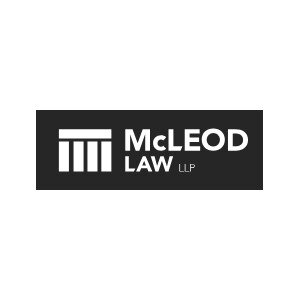Best Commercial Real Estate Lawyers in Calgary
Share your needs with us, get contacted by law firms.
Free. Takes 2 min.
Free Guide to Hiring a Real Estate Lawyer
List of the best lawyers in Calgary, Canada
About Commercial Real Estate Law in Calgary, Canada:
Commercial Real Estate Law in Calgary, Canada, involves a complex network of municipal, provincial and federal laws. This network of laws caters to a broad range of activities related to commercial property, from the acquisition and sale of properties to leasing, financing, and development issues. It also covers property tax, zoning, land use, environmental protections, and any disputes that may arise regarding the possession and use of commercial property.
Why You May Need a Lawyer:
Engaging a lawyer when dealing with commercial real estate in Calgary, Canada, is crucial due to the complex nature of the laws and regulations involved. You might need a lawyer when buying, selling or leasing a commercial property, or if you face disputes related to the ownership or usage of a property. Lawyers can also assist with navigating zoning laws, environmental regulations, and property tax issues. Moreover, should you wish to develop or modify a commercial property, an experienced lawyer can help you navigate planning and development laws.
Local Laws Overview:
Local laws in Calgary that affect commercial real estate largely relate to zoning and land use, environmental regulations, property tax, and development. Zoning bylaws determine how a property can be used, whether for residential, commercial, or industrial purposes. Any changes to a property's use, or alterations or developments to a property, require planning permissions. Environmental regulations ensure any potential environmental issues associated with a property are adequately addressed. Property tax laws in Calgary oversee how commercial properties are assessed and taxed.
Frequently Asked Questions:
1. How are commercial properties taxed in Calgary?
Commercial properties in Calgary, Canada are taxed based on the assessed value of the property, determined annually by the City of Calgary. Rates may differ depending on zoning and property use.
2. What are zoning laws and why are they important?
Zoning laws regulate land use in Calgary. They determine what type of activities (such as commercial, residential, or industrial) can occur on a specific property. They are important as they maintain order and control over the growth and development of the city.
3. What is involved in buying a commercial property?
The process involves several steps including finding a suitable property, negotiating a price, conducting a due diligence review, obtaining necessary financing, and finally, completing the transaction legally with a real estate attorney's help.
4. Can I change the use of a commercial property?
Changing the use of a commercial property typically involves applying for a change in zoning or a zoning variance. This requires approval from the City of Calgary and may also involve consultations with neighbors and other stakeholders.
5. What is a property title search?
A property title search is a legal process that details the ownership history of a property, any liens against it, and any restrictions on its use. It's a crucial step in buying or selling commercial real estate.
Additional Resources:
Additional resources that can provide assistance include the Alberta Real Estate Association, the City of Calgary's Planning & Development department, and the Law Society of Alberta which can provide referrals to experienced commercial real estate lawyers.
Next Steps:
If you're in need of legal assistance, the first step is to engage a knowledgeable commercial real estate lawyer. To ensure the best outcome, it's important to have your legal representative involved from the beginning of any real estate process. You should also ensure you understand your legal rights and obligations, potential risks, and any necessary applications or procedures before proceeding.
Lawzana helps you find the best lawyers and law firms in Calgary through a curated and pre-screened list of qualified legal professionals. Our platform offers rankings and detailed profiles of attorneys and law firms, allowing you to compare based on practice areas, including Commercial Real Estate, experience, and client feedback.
Each profile includes a description of the firm's areas of practice, client reviews, team members and partners, year of establishment, spoken languages, office locations, contact information, social media presence, and any published articles or resources. Most firms on our platform speak English and are experienced in both local and international legal matters.
Get a quote from top-rated law firms in Calgary, Canada — quickly, securely, and without unnecessary hassle.
Disclaimer:
The information provided on this page is for general informational purposes only and does not constitute legal advice. While we strive to ensure the accuracy and relevance of the content, legal information may change over time, and interpretations of the law can vary. You should always consult with a qualified legal professional for advice specific to your situation.
We disclaim all liability for actions taken or not taken based on the content of this page. If you believe any information is incorrect or outdated, please contact us, and we will review and update it where appropriate.













